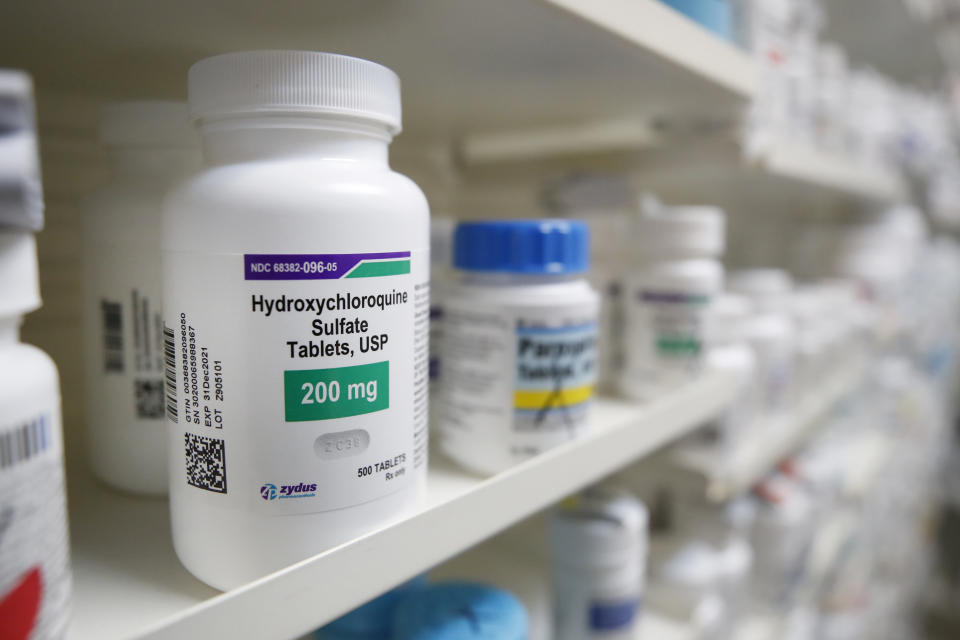White House encourages hydroxychloroquine use for coronavirus again
WASHINGTON — The White House continued on Thursday to promote the use of hydroxychloroquine, the antimalarial drug that President Trump and some of his supporters have held out as a treatment for the coronavirus, against the advice of the Food and Drug Administration and in the face of studies that have shown it can be harmful in some cases.
The drug, which is also used by lupus patients, has become a flash point in the politicization of the pandemic response, along with the wearing of face masks. Routinely touted by prominent conservative allies of the president, including primetime Fox News anchor Laura Ingraham, it has been denounced by members of the medical establishment as an unproven therapy that poses the risk of potentially fatal heart complications.
The FDA recommends that COVID-19 patients, if they choose to use it, do so only in a hospital or under medical supervision in a clinical trial.
The divide between medical experts and the president’s lay advisers and media supporters seems all but certain to persist, even as COVID-19 is showing signs of slowing nationally (while spiking in some parts of the country).
Speaking during a press briefing on Thursday, White House press secretary Kayleigh McEnany strongly endorsed the “prophylactic” use of hydroxychloroquine: that is, to prevent contracting the coronavirus. That’s different from someone using the drug once already sick with COVID-19, the disease caused by the virus. McEnany did not appear to be referring to this second type of use.

Earlier this month, the president surprised the nation by announcing he was taking the drug, which he said he would do for a period of two weeks. That treatment presumably concluded earlier this week. Trump is regularly administered a coronavirus diagnostic test, and there was no indication that he had contracted the pathogen.
But he may have decided to take the drug as he begins to leave the White House and travel more frequently. A study published in the Lancet last month said hydroxychloroquine and a related drug, chloroquine, showed promise in the area of coronavirus prophylaxis.
McEnany said on Thursday that the president was “feeling absolutely great after taking this regimen” and “would take it again.” Addressing the widespread skepticism about hydroxychloroquine, she urged the White House reporters who were socially distanced and masked in the seats before her to read what she deemed a “very thorough” article on hydroxychloroquine published in the outlet Science News.
That article has the headline “Politics aside, hydroxychloroquine could (maybe) help fight COVID-19.” The article’s author, Tina Hesman Saey, has a doctorate in molecular genetics and was a practicing geneticist, according to her biography, before turning to journalism.
Far from issuing a blanket endorsement of the drug, Saey writes that there is “not enough data to say whether the drug can protect people from catching COVID-19 or from getting very ill if they do get infected with the virus.” She notes that hydroxychloroquine has antiviral properties but could also cause “dangerous side effects,” particularly in people with heart conditions.
During the press briefing, McEnany mentioned that the article cited Sarah Lofgren, an infectious disease specialist at the University of Minnesota Medical School who was studying the use of hydroxychloroquine for precisely the kind of preventive application the press secretary was endorsing.
“When used alone, we’re not seeing major issues,” Lofgren told Saey, noting the absence of “heart arrhythmias” in the cohort she was studying.

This is only the latest chapter in the long and muddled tale of hydroxychloroquine, whose promise has ebbed and flowed on a near-daily basis. On a given day, its promise could be boosted by a presidential pronouncement and then discounted by a scientific study.
Only the day before McEnany spoke, Dr. Anthony Fauci, director of the National Institute of Allergy and Infectious Diseases at the National Institutes of Health and a prominent member of the White House coronavirus task force, told CNN that “the scientific data is really quite evident now about the lack of efficacy.”
There had been earlier hopes that hydroxychloroquine could be used to treat COVID-19 in conjunction with azithromycin, an antibiotic. On March 21, Trump, then at the height of his hydroxychloroquine enthusiasm, declared on Twitter that the combination was possibly “one of the biggest game changers in the history of medicine.”
New research indicates, however, that the combination of the two is “potentially lethal.”
_____
Click here for the latest coronavirus news and updates. According to experts, people over 60 and those who are immunocompromised continue to be the most at risk. If you have questions, please refer to the CDC’s and WHO’s resource guides.
Read more:



